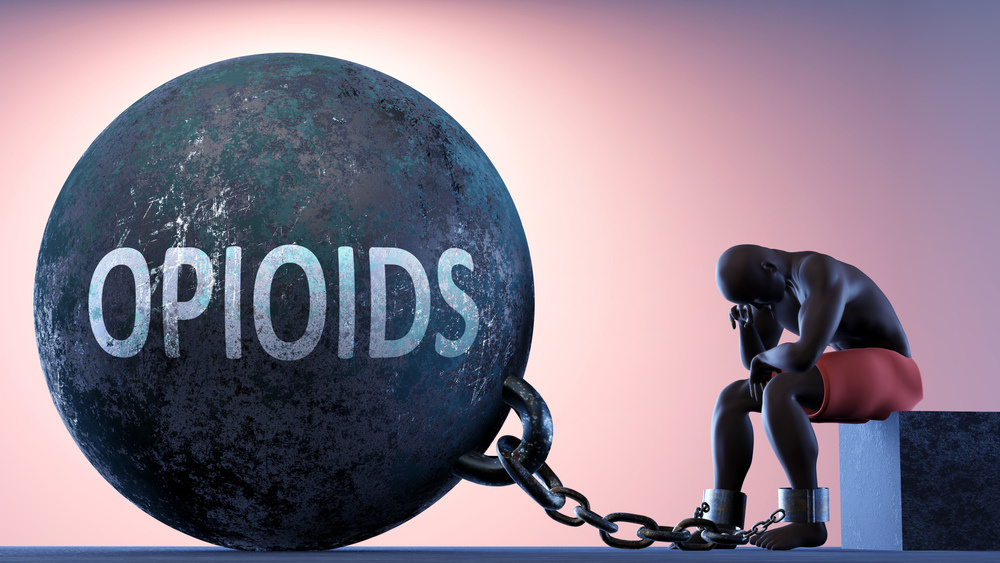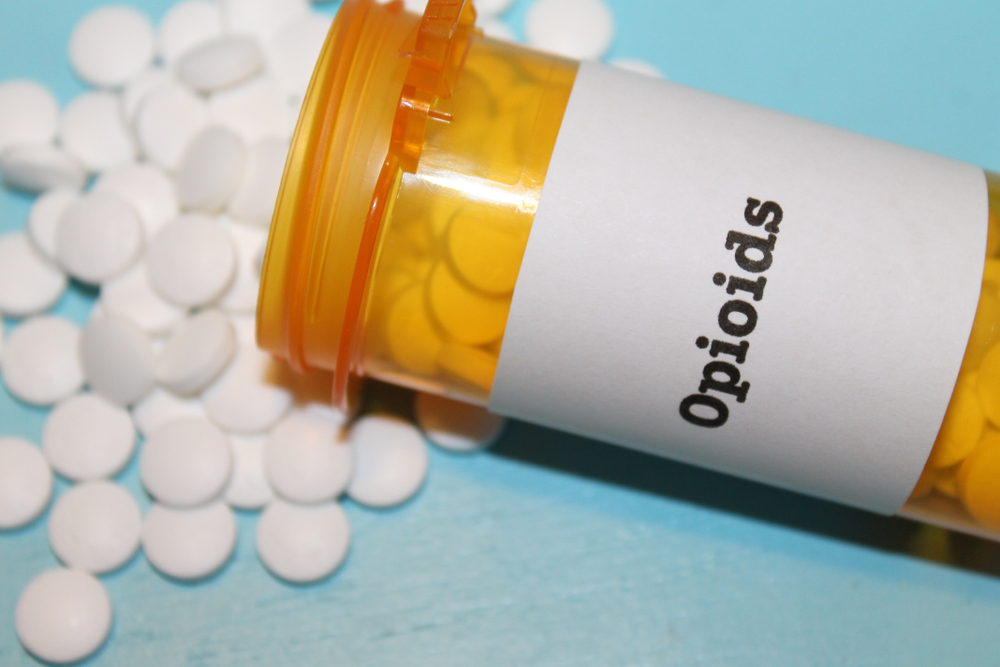Last Updated:
July 25th, 2025
Opioid Addiction | Symptoms, Causes and Types
The opioid crisis has left an unimaginable mark on millions of lives across North America, making it one of the most significant public health challenges of our time. Experts across the board have long blamed the overprescription of opioid painkillers as the key factor behind this epidemic. While the UK has not experienced the same scale of destruction, opioid addiction remains a serious issue here, too. Almost half of all drug-related deaths in the UK are caused by opioids, with many other devastating consequences for individuals, families and communities.

What is an opioid?
Opioids are drugs that work on special parts of the brain and body called opioid receptors. They get their name because they act like opium, a drug that comes from the opium poppy plant.
Opioid receptors are responsible for how we experience pain, so when you take opioids, they block pain signals from reaching your brain. However, while these pain-killing qualities can be very useful in medicine, opioids can also make you feel peaceful or blissfully happy. These feelings can be so powerful that some people start using opioids too much, which is often the first step to addiction.
Different types of opioid drugs
Here are some of the different types of opioid drugs which can potentially be addictive:
Opiates
These come straight from the opium poppy and include morphine and codeine. They work by sticking to your opioid receptors, dulling pain and giving you a peaceful buzz.
Synthetic opioids
These are made from scratch in labs without using any part of the opium plant. They also stick to those same spots in the brain, but they can be a lot stronger. There are various types of synthetic opioids, including methadone and fentanyl.
Semi-synthetic opioids
These are kind of a mix of natural and synthetic opioid drugs, which include Oxycodone and heroin. To make semi-synthetic opioids, scientists start with natural opium and then change it around in the lab to make new substances.
Struggling with an addiction? If you are ready to seek help, reach out to us today, and a member of our compassionate team will help you find the best option for starting your recovery journey.
What is opioid addiction?
Opioid addiction is when someone can’t stop taking opioids even though their drug use is causing trouble in their life. It is often misconstrued as a lack of willpower, but in fact, opioid addiction is a serious physical and mental illness that can happen to anyone.
Opioid addiction can develop with any opioid, but in the UK and other places around the world, a big problem is people getting addicted to prescription opioid drugs. Some of the most common prescription opioid addictions include:
Codeine addiction
Codeine is one of the milder opioid drugs that is used as a painkiller and is also found in some cough syrups. However, while it may not be as strong as others, you can still get hooked on codeine if you take it for too long or in excessive doses.
Fentanyl addiction
Fentanyl is a powerful painkiller that has become a big problem, especially in the US. Fentanyl is many times stronger than other opioid drugs, and it now causes more fatal overdoses in North America than any other drug.
Methadone addiction
Methadone is a medicine used to help people stop using stronger opioids. However, in some cases, methadone itself can be habit-forming, replacing one opioid addiction with another.
Oxycodone (OxyContin addiction)
Oxycodone is another powerful opioid painkiller that is often blamed as being the main culprit behind the Opioid Crisis in North America. It has caused so many cases of opioid overdose and addiction that OxyContin’s approval was described as “one of the greatest mistakes of modern medicine” by the head of the FDA.
Tramadol addiction
Tramadol is a medium-strength opioid painkiller that can quickly lead to dependency. If you start taking more tramadol than you were prescribed or when you no longer need it for pain, opioid addiction can develop before you realise it.
Vicodin addiction
Vicodin is an opioid pain reliever that mixes hydrocodone with paracetamol for well-rounded effects. However, Vicodin is very strong and can be highly addictive without proper medical oversight.
Buprenorphine addiction
Like methadone, buprenorphine is supposed to help people stop using stronger opioid drugs. However, some people may start to feel like they can’t stop using buprenorphine, trapping them in a new form of opioid addiction.
Dihydrocodeine addiction
Dihydrocodeine is a type of medicine used to treat really severe pain and breathing issues. However, it is a very powerful drug and can cause rapid physical and mental dependency and enormous risks to health and well-being.
Dilaudid addiction
Dilaudid, often prescribed after surgeries for severe pain, can be highly addictive. Its powerful effect can lead users to develop a tolerance quickly, needing more to get relief, and if they quit suddenly, they can experience intense withdrawal symptoms.
Demerol addiction
Demerol is used to manage sharp pain that may come from surgical procedures or injuries. It works fast, but that also means it can be habit-forming as users start to depend on it not just for pain relief but to feel “normal”.
Hydrocodone addiction
Hydrocodone is commonly prescribed for everything from dental procedures to injuries. It is effective for pain management but its easy accessibility can lead to misuse and opioid addiction.
Morphine addiction
Morphine is one of the most potent and powerful opioid drugs used post-surgery or when someone is in extreme pain. It has been a go-to painkiller for centuries, but misuse can lead to both opioid addiction and potential opioid overdose.
What causes opioid addiction?
Opioid addiction can start in several ways, including taking prescription medicines for longer or in higher doses than your doctor says, self-medicating with opioid drugs or using them to get high. However, we all have different chances of developing opioid addiction due to our unique mixture of risk factors. These include:
- Your genetics
- Any history of addiction in your family
- Being affected by chronic pain or mental illness
- How easily you can get opioid drugs
- Which opioids you are taking, and how you are taking them
- The environment where you grew up
- A lot of stress in your lives
It is crucial that any doctors who are prescribing opioid drugs discuss these risk factors with their patients to minimise the risk of opioid addiction.
The signs of opioid addiction
Worried that you or a friend or family member may have a problem? Here are some signs of opioid addiction to look out for:
- Feeling the increasing need for more opioids
- Getting sick when you stop
- Missing, no longer enjoying or underperforming at work, school and hobbies
- Planning your entire day around using opioid drugs
- Lying to your doctor, friends and family about how your opioid use has escalated
- Continuing to use opioid drugs even though these problems are becoming increasingly obvious
If you are becoming aware of these opioid addiction signs and symptoms, you should seek professional help for opioid addiction right away. The earlier the intervention, the better the chances of successful treatment.
The mental and physical dangers of opioid addiction
There are so many dangers of opioid addiction that even prescription opioid drugs are considered to be among the most dangerous known substances. Some of the most serious opioid addiction symptoms include:
- Opioid overdose: Opioid toxicity varies between different drugs but all carry the risk of opioid overdose. This risk increases enormously with more potent opioid drugs like fentanyl, when you take large doses and when you mix opioids with alcohol or other drugs.
- Mental health struggles: Depression, anxiety and PTSD symptoms can all be made worse by opioid drugs. Opioid addiction can also trigger new mental health struggles which can affect individuals long after they stop using opioids.
- Infections: Needle sharing can spread dangerous infectious diseases like HIV and Hepatitis C. Opioid abuse and addiction can also increase the likelihood of dangerous sexual behaviour, which is another route of infection.
- Breathing problems: Opioid drugs can make it hard to breathe properly, which might lead to a condition called hypoxia. This means not enough oxygen gets to the brain which can cause serious, long-lasting damage and even death.
- Stomach problems: Long-term opioid use can cause chronic constipation which may lead to serious issues like blockages or tears in your stomach.
- Heart problems: Opioid drugs can also affect your heart, especially if they’re injected, including infections and the risk of heart attacks and strokes.
How to overcome opioid addiction
When someone needs to beat opioid addiction, the first step is opioid detox. This is when doctors help you slowly stop taking opioid drugs while monitoring your health and safety. Detox usually involves a tapering process and opioid replacement therapy using a drug like methadone to minimise withdrawal symptoms. These are the uncomfortable and potentially dangerous reactions of your brain and body to quitting opioid drugs.
After detox, opioid rehab is the next important step. Rehab is available through the NHS and private addiction treatment centres with approaches varying between different centres. The most effective rehab programmes are generally considered inpatient ones, offering a wide range of therapies and comprehensive aftercare programmes.

Where can I get help?
If you are struggling with opioid addiction, then get in touch with us. Addiction Helper can help you find the best treatment option for you. Opioid addiction is a dangerous but treatable condition, and the earlier you get professional help, the better your chances of a full and lasting recovery.
Our compassionate team are ready and available to take your call, and guide you towards lasting the lasting addiction recovery you deserve.
Frequently Asked Questions
(Click here to see works cited)
- UK Rehab. “Opioid Addiction | Causes, Symptoms and Diagnosis.” UK Rehab, https://www.uk-rehab.com/prescription-drug-addiction/opioid/. Accessed 13 January 2025.
- NCBI. “Opioid Use Disorder – StatPearls.” NCBI, 17 January 2024, https://www.ncbi.nlm.nih.gov/books/NBK553166/. Accessed 13 January 2025.
- Office for National Statistics. “Deaths related to drug poisoning in England and Wales: 2022 registrations.” Office for National Statistics, 19 December 2023, https://www.ons.gov.uk/peoplepopulationandcommunity/birthsdeathsandmarriages/deaths/bulletins/deathsrelatedtodrugpoisoninginenglandandwales/2022registrations. Accessed 13 January 2025.
- World Health Organization (WHO). “Opioid overdose.” World Health Organization (WHO), 29 August 2023, https://www.who.int/news-room/fact-sheets/detail/opioid-overdose. Accessed 13 January 2025.

